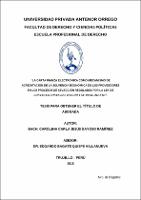Mostrar el registro sencillo del ítem
La carta fianza electrónica como mecanismo de acreditación de la solvencia económica de los proveedores en los procesos de selección regulados por la ley de contrataciones del Estado y su reglamento
| dc.contributor.advisor | Quispe Villanueva, Edgardo Bagate | |
| dc.contributor.author | Gayoso Ramírez, Carolina Carla Jesús | |
| dc.creator | Gayoso Ramírez, Carolina Carla Jesús | |
| dc.date.accessioned | 2018-11-13T13:20:09Z | |
| dc.date.available | 2018-11-13T13:20:09Z | |
| dc.date.issued | 2018 | |
| dc.identifier.uri | https://hdl.handle.net/20.500.12759/4466 | |
| dc.description.abstract | La ejecución de las obras publicas en el Perú se ha visto ensombrecido por una serie de actos de corrupción, cuyos inicios lo tenemos en los autos fraudulentos de un gran número de contratistas quienes presentan: declaraciones falsas y documentación alterada para, entre otras cosas, mejorar sus presupuestas, para pretender justificar que cumplen con las especificaciones del contrato o para sustentar facturas infladas, entre otros. Así, uno de los casos más relevantes es el de la presentación de cartas fianzas falsas, las cuales están reguladas en el artículo 33° de la Ley N° 30225, Ley de Contrataciones del ESTADO (en adelante LCE), y toman los nombres de Garantía de Fiel Cumplimiento del Contrato y Garantía por Adelantos. Asimismo, el Reglamento de la Ley de Contrataciones del Estado (RLCE), D.S. N° 350-2015-EF, lo recoge en los artículos 125° y siguientes. Si bien tanto la Ley como su reglamento, establece una serie de precisiones respecto a la carta fianza, debemos manifestar que es usual que los proveedores presentan garantías falsificadas; generando con ello la desprotección a la entidad pública y que las contrataciones queden inconclusas, en desmedro del interés público. Por lo expuesto, a través de la presente investigación se plantea un ajuste en la presentación de la denominada carta fianza, a fin de que sin generar un mayor costo de transacción y sin sobrecarga el proceso de ejecución contractual mediante controles innecesarios. Del mismo modo, buscamos que sea remitida a la entidad pública contratante de forma directa y vía electrónica por parte de la entidad bancaria – financiera que corresponda. En ese sentido, consideramos necesario la delimitación de la problemática descrita, del como la implementación de mecanismos legales en la LCE de naturaleza preventiva, obligatoria y sancionadora les permita a las entidades públicas tener la seguridad necesaria para poder suscribir futuros contratos con sus proveedores. | es_PE |
| dc.description.abstract | The execution of public works in Peru has been overshadowed by a series of acts of corruption, whose beginnings we have in the fraudulent cars of a large number of contractors who present: false statements and altered documentation to, among other things, improve its presuppositions, to pretend to justify that they meet the specifications of the contract or to support inflated invoices, among others. Thus, one of the most relevant cases is the presentation of false bail bonds, which are regulated in article 33 of Law N ° 30225, Law of State Contracting (hereinafter LCE), and take the names of Guarantee of Faithful Compliance with the Contract and Guarantee for Advances. In addition, the Regulation of the Law on Government Procurement (RLCE), D.S. No. 350-2015EF, it is included in articles 125 and following. Although both the Law and its regulations establish a series of clarifications regarding the letter of guarantee, we must state that it is usual for suppliers to present falsified guarantees; generating with it the lack of protection to the public entity and that the hiring remains inconclusive, at the expense of the public interest. Based on the foregoing, the present investigation proposes an adjustment in the presentation of the so-called letter of guarantee, so that without generating a higher transaction cost and without overloading the contractual execution process through unnecessary controls. In the same way, we seek that it be remitted to the contracting public entity directly and electronically by the corresponding banking - financial entity. In this regard, we consider it necessary to delimit the problem described, how the implementation of legal mechanisms in the LCE of a preventive, mandatory and sanctioning nature allows public entities to have the necessary security to be able to sign future contracts with their suppliers. | en_US |
| dc.description.uri | Tesis | es_PE |
| dc.format | application/pdf | es_PE |
| dc.language.iso | spa | es_PE |
| dc.publisher | Universidad Privada Antenor Orrego - UPAO | es_PE |
| dc.relation.ispartofseries | T_DERE_422 | |
| dc.rights | info:eu-repo/semantics/openAccess | es_PE |
| dc.source | Universidad Privada Antenor Orrego | es_PE |
| dc.source | Repositorio Institucional - UPAO | es_PE |
| dc.subject | Carta fianza | es_PE |
| dc.subject | Solvencia | es_PE |
| dc.title | La carta fianza electrónica como mecanismo de acreditación de la solvencia económica de los proveedores en los procesos de selección regulados por la ley de contrataciones del Estado y su reglamento | es_PE |
| dc.type | info:eu-repo/semantics/bachelorThesis | es_PE |
| thesis.degree.level | Título Profesional | es_PE |
| thesis.degree.grantor | Universidad Privada Antenor Orrego. Facultad de Derecho y Ciencias Políticas | es_PE |
| thesis.degree.name | Abogado | es_PE |
| thesis.degree.discipline | Derecho | es_PE |
Ficheros en el ítem
Este ítem aparece en la(s) siguiente(s) colección(es)
-
Derecho [428]

